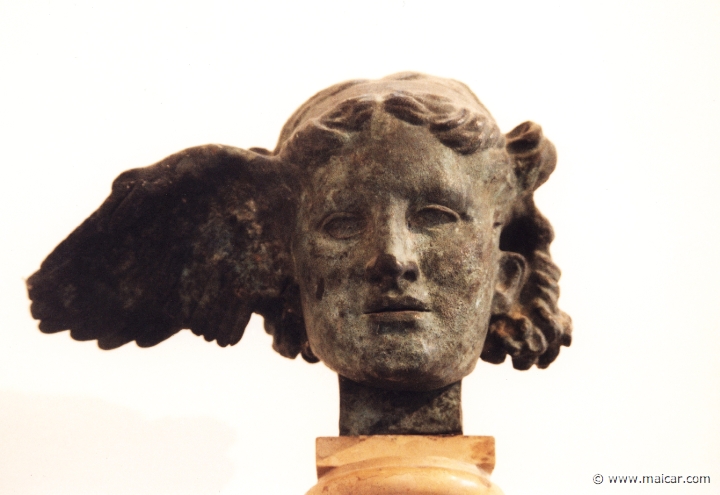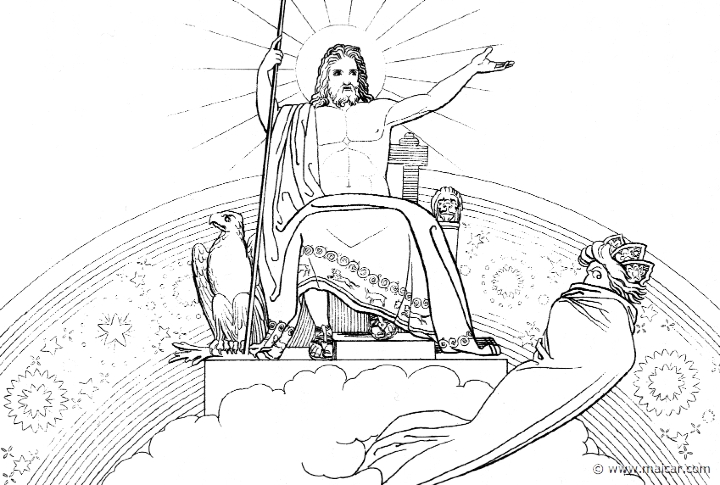 |
|
"… whenever in his imagination a man sees delights, straightaway the vision, slipping through his arms, is gone, winging its flight along the paths of Sleep." (Argive Elders. Aeschylus, Agamemnon 420).
"… almighty Sleep releases the fettered sleeper, and does not hold him in a perpetual grasp." (Ajax 1. Sophocles, Ajax 675).
"What presumption of man, can match your power, Zeus, who are no subject to Sleep or Time or Age, living forever in bright Olympus?" (Theban Elders. Sophocles, Antigone 605).
"Divine Sleep, god who knows no pain, Sleep, stranger to anguish, come in favor to us, come happy, and giving happiness, great King! … come with power to heal!" (Sailors of Neoptolemus' crew. Sophocles, Philoctetes 830).
"O Sleep, rest of all things, mildest of the gods, balm of the soul …" (Iris 1 to Hypnos. Ovid, Metamorphoses 1.623).
"Sleep is a death, O make me try
By sleeping, what it is to die,
And as gently lay my head
On my grave, as now my bed." (Sir Thomas Browne 1605-82, Religio Medici II.12).
|
|
|
|
Sancho: "…sólo entiendo que en tanto que duermo, ni tengo temor, ni esperanza, ni trabajo, ni gloria; y bien haya el que inventó el sueño, capa que cubre todos los humanos pensamientos, manjar que quita la hambre, agua que ahuyenta la sed, fuego que calienta el frío, frío que templa el ardor, y, finalmente, moneda general con que todas las cosas se compran, balanza y peso que iguala al pastor con el rey y al simple con el discreto. Sola una cosa tiene mala el sueño según he oído decir, y es que se parece a la muerte, pues de un dormido a un muerto hay muy poca diferencia."
(Miguel de Cervantes, Don Quijote de la Mancha, Segunda Parte, Capítulo LXVIII).
|
|
Sancho: "… but this I very well know, that while I am asleep, I feel neither hope nor despair; I am free from pain and insensible of glory. Now blessings light on him that first invented this same sleep: it covers a man all over, thoughts and all, like a cloak; it is meat for the hungry, drink for the thirsty, heat for the cold, and cold for the hot. It is the current coin that purchases all the pleasures of the world cheap; and the balance that sets the king and the shepherd, the fool and the wise man even. There is only one thing, which somebody once put into my head, that I dislike in sleep; it is that it resembles death; there is very little difference between a man in his first sleep, and a man in his last sleep."
(Miguel de Cervantes, Don Quixote, Part II, Chapter LXVIII).
|
|
|
|
|
|

|
7522: Hypnos. Bronze head of Hypnos, 4C BC. Copy at Axel Munthe's Villa San Michele, Capri.
|
|
Hypnos, who some say is the god that is dearest
to the MUSES, is Sleep and
Dream. He is the younger brother of Thanatos (Death), and Nyx (Night) is the nurse of
both.
Sleep resembles Death
It has been ordained that Hypnos and Thanatos should have all things in common. Hypnos, the younger, imitates the other in everything. He had been surnamed "The Bountiful," for this is the god who puts cares to flight, and soothes the bodies of both mortals and immortals. He can fashion shapes that seem to be true forms, and in his art he receives help from his sons.
The abode of Hypnos
Hypnos, they say, has his abode within a hollow
mountain in Cimmeria, which is to the north of the
Black Sea. In this place, silence and twilight
shadows reign, and from the bottom of the cave
there flows the stream of Lethe (Oblivion), whose
murmuring waves invite to slumber. Before the
entrance, where poppies bloom, there are also
countless herbs which cause somnolence. Hypnos
himself lies with heavy eyelids on a high couch of
ebony in the cavern's central space, surrounded by
empty dream-shapes, which mimick many forms.
Sons of Hypnos
Morpheus is a cunning imitator of the human
form, skilled in representing the features and the
speech of men in dreams, as well as the clothing
and the accustomed words of each he represents.
Phobetor is the one who represents the forms of
beasts, or birds, or serpents, in men's dreams; and
Phantasus is in charge of putting deceptive shapes
of earth, rocks, water, trees, or other lifeless
things in the dreams of men.
Hypnos' wife
Hera promised Hypnos to give him Pasithea 2 (one of the CHARITES) as a bride if
he would help her to let Zeus fall asleep. This he
did in spite of his fears; for once before he
performed a similar task, also at Hera's request. But Zeus woke up in anger and
sought Hypnos everywhere, and the god would have
hurled him from heaven into the deep, had Nyx not saved him. For also Nyx is a powefurl goddess,
who prevails over both gods and men.
Iris 1 asks for service
Also Iris 1 came to
Hypnos, sent by Hera, to
ask him fashion a shape resembling Ceyx, which appearing
before Ceyx's wife Alcyone 2, would inform her of her husband's death.
Oniros
But Oniros (Dream), child of Nyx, comes also to men in
their sleep through any of the two Gates of Sleep.
Through the Gate of Horn come forth those dreams
which bring true issues to pass, but through the
Gate of Ivory come those dreams which deceive men,
bringing words that find no fulfilment.So when f For example, when Zeus wished to vindicate Achilles for what King Agamemnon had done to
him, he decided to send Agamemnon a false
dream in the shape of Nestor, the king's
trusted councillor, so that Agamemnon would believe that the hour of victory was at hand and that he would soon take the city of Troy, which was completely false—an illusion.
|

|
Zeus and Oniros | il043flax: “Up, go, thou baneful Dream, unto the swift ships of the Achaeans, and when thou art come to the hut of Agamemnon, son of Atreus, tell him all my word truly, even as I charge thee." (Hom.Il.2.10). John Flaxman (1755 – 1826).
|
|
|
| Family |
|
|
|
|
|
|
|
|
-
Morpheus
-
Phobetor
-
Phantasus
|
Pasithea 2 is the elder of the CHARITES.
|
|
|
|
|
|
| Related sections |
Hypnos in GROUPS: NYX'S OFFSPRING, PERSONIFICATIONS |
|
|
Sources
Abbreviations |
Col.366; Hes.The.213;
Hom.Il.14.231, 14.265ff.; Hyg.Pre; Nonn.2.237, 14.88,
16.261, 16.282, 16.284; Ov.Met.11.635; Pau.9.35.4;
QS.5.403; Stat.Theb.5.199;
Val.8.70.
|
|
|